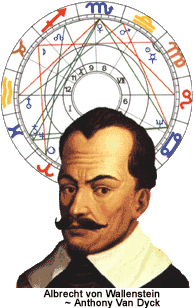Albrecht von Wallenstein
In 1608, at the age of 25, an officer in the service of the king of Bohemia had his horoscope cast by Johannes Kepler. Like most of his contemporaries, the young man believed that the position of the planets and stars at the time of birth determines a person's character and that the signs of the zodiac hold the clues to one's fate in life. Since the officer had used an intermediary to approach the famous astronomer and mathematician, Kepler did not know the identity of the person whose character he was being asked to analyze. And even if he had known, the name would have meant nothing to him. For Albrecht von Wallenstein, fame and fortune were still far in the future. Born at 4:36 p.m. on September 24, 1583, Wallenstein was a Libra. According to Kepler's interpretation, the subject of the horoscope was "alert, lively, eager and restless, curious of every kind of novelty, unsuited to the common manner and behavior of mankind, but striving after new, untried or extraordinary ways." Saying less than he thought or perceived, the taciturn individual had a melancholy streak, or what the astrologer described as "a bent toward alchemy, magic, and enchantment, community with spirits, scorn and indifference toward human ordinances and conventions and to all religions, making everything proposed by God or man to be suspected and despised." Furthermore, Kepler predicted, the subject would be "lunmerciful, without brotherly or matrimonial love, caring for-no one, devoted only to himself and his desires, severe upon those placed under him, parsimonious, covetous, deceitful, inequitable in his dealings, usually silent, often impetuous, also belligerent and fearless."
Born at 4:36 p.m. on September 24, 1583, Wallenstein was a Libra. According to Kepler's interpretation, the subject of the horoscope was "alert, lively, eager and restless, curious of every kind of novelty, unsuited to the common manner and behavior of mankind, but striving after new, untried or extraordinary ways." Saying less than he thought or perceived, the taciturn individual had a melancholy streak, or what the astrologer described as "a bent toward alchemy, magic, and enchantment, community with spirits, scorn and indifference toward human ordinances and conventions and to all religions, making everything proposed by God or man to be suspected and despised." Furthermore, Kepler predicted, the subject would be "lunmerciful, without brotherly or matrimonial love, caring for-no one, devoted only to himself and his desires, severe upon those placed under him, parsimonious, covetous, deceitful, inequitable in his dealings, usually silent, often impetuous, also belligerent and fearless."It was not an attractive profile. Yet Kepler offered hope to the unknown subject of his forecast: "Most of these flaws will disappear with maturity; so unusual a nature will be capable of important deeds." Because of his great ambition and thirst for power, the individual thus described would make many enemies; but in most instances he would be able to defeat them.
Young Wallenstein was deeply impressed with Kepler's horoscope and kept it with him constantly, comparing major occurrences in his life with the predictions. Born and raised a Protestant but a cynical convert to Catholicism at the age of 23, Wallenstein lacked serious religious conviction; his faith was in the stars. Throughout life he would often seek the advice of astrologers, making important decisions only after the stars had been read for him.
Horoscope
Despite the universal scoffing of scientists, the belief that character is determined by date of birth and that favorable and unfavorable signs can be read in a horoscope persists.- Joseph Goebbels, Hitler's propaganda minister, maintained an astrology department to aid his skillful if insidious manipulation of the media.

- Indian prime minister Indira Gandhi was said to have made no important decisions without consulting a personal guru. And three weeks before his fall, the shah of Iran sought advice from a Jerusalem astrologer. Having read in the stars of the imminent, unpreventable end of the shah's regime, the man declined to make the journey to Teheran.
- Cambodia's president Lon Nol relied less on the advice of his generals than he did on his astrologers.
- The best known recent adherent to astrology is Nancy Reagan, wife of the ex-president, thanks to the far from flattering revelations of former White House chief of staff Donald T. Regan in his 1988 memoir, For the Record. According to Regan, Mrs. Reagan's reliance on horoscopes, and the influence that her belief in them had on the president's schedule, "was probably the most closely guarded domestic secret of the Reagan White House." In 1981 San Francisco astrologer Joan Quigley convinced Mrs. Reagan that the assassination attempt on the president of March 30 could have been predicted. Thereafter, presidential appointments were determined by favorable horoscopes from Mrs. Quigley.

